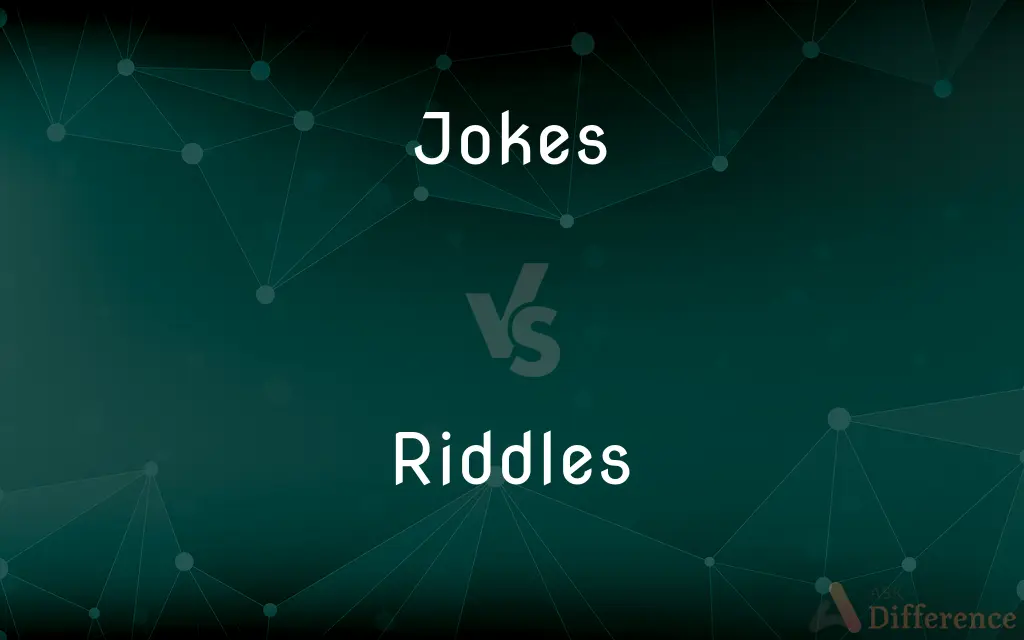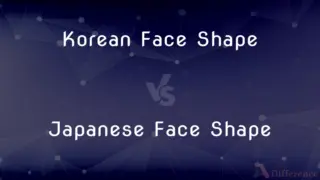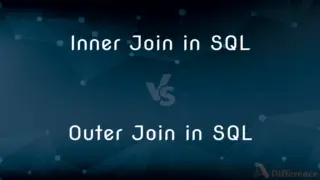Jokes vs. Riddles — What's the Difference?
By Tayyaba Rehman & Fiza Rafique — Published on February 2, 2024
Jokes are humorous stories or statements intended to provoke laughter; riddles are puzzles or questions requiring thought and clever reasoning to find an answer.

Difference Between Jokes and Riddles
Table of Contents
ADVERTISEMENT
Key Differences
Jokes are primarily designed to entertain and amuse, often using surprise or a punchline to evoke laughter. Riddles, conversely, aim to engage the listener's deductive reasoning skills, typically requiring a thoughtful and clever answer.
The structure of a joke often includes a setup and a punchline, where the humor comes from an unexpected twist or a play on words. Riddles, on the other hand, are formulated as questions or statements that present a puzzle to be solved, often with witty or unexpected solutions.
Jokes can be of various types, including knock-knock jokes, one-liners, or extended stories with a humorous climax. Riddles are often succinct and rely on wordplay, double meanings, or clever interpretation to arrive at the solution.
The purpose of a joke is to evoke immediate laughter and provide entertainment. In contrast, riddles are designed to challenge the listener's thinking and may provide intellectual satisfaction upon solving.
Jokes often reflect cultural humor and can be subjective in their appeal. Riddles, while also culturally influenced, primarily engage through the puzzle element and can have more universal appeal due to their focus on problem-solving.
ADVERTISEMENT
Comparison Chart
Primary Purpose
To entertain and provoke laughter
To present a puzzle requiring thought
Structure
Setup followed by a punchline
A question or statement posing a puzzle
Type
Varied, including one-liners, stories
Often succinct, based on wordplay
Audience Engagement
Elicits immediate laughter
Engages deductive reasoning
Cultural Influence
Reflects cultural humor, subjective
Culturally influenced, focuses on problem-solving
Compare with Definitions
Jokes
A joke can be a playful imitation or mockery in a light-hearted manner.
I'm reading a book on anti-gravity. It's impossible to put down!
Riddles
A riddle is a puzzling question posed as a problem to be solved.
What comes once in a minute, twice in a moment, but never in a thousand years? The letter 'M'.
Jokes
A joke is a form of entertainment that uses humor as its main element.
I have a joke about construction, but I'm still working on it.
Riddles
Riddles often involve plays on words or require creative thinking for their solutions.
I'm light as a feather, yet the strongest person can't hold me for much more than a minute. What am I? Breath.
Jokes
A joke is a short, humorous anecdote designed to provoke laughter.
Why don't scientists trust atoms? Because they make up everything!
Riddles
Riddles are brain teasers that challenge one's thinking and reasoning skills.
I speak without a mouth and hear without ears. What am I? An echo.
Jokes
Jokes are witty remarks or stories with a humorous twist.
I told my wife she should embrace her mistakes. She gave me a hug.
Riddles
A riddle is a form of word puzzle that typically involves a double or hidden meaning.
What has a head, a tail, is brown, and has no legs? A penny.
Jokes
Something said or done to evoke laughter or amusement, especially an amusing story with a punch line.
Riddles
A riddle is a question or statement intentionally phrased to require ingenuity in ascertaining its answer.
What has keys but can't open locks? A piano.
Jokes
A mischievous trick; a prank
Played a joke on his roommate.
Riddles
To pierce with numerous holes; perforate
Riddle a target with bullets.
Jokes
Something that is of ludicrously poor quality
Their delivery service is a joke.
Riddles
To spread throughout
"Election campaigns have always been riddled with demagogy and worse" (New Republic).
Jokes
Something not to be taken seriously; a triviality
The accident was no joke.
Riddles
To put (gravel, for example) through a coarse sieve.
Jokes
An object of amusement or laughter; a laughingstock
His loud tie was the joke of the office.
Riddles
To solve or explain.
Jokes
To tell or play jokes; jest.
Riddles
To propound or solve riddles.
Jokes
To speak in fun; be facetious
You have to be joking.
Riddles
To speak in riddles.
Jokes
To say or write as a joke.
Riddles
A coarse sieve, as for gravel.
Jokes
Plural of joke
Riddles
A question or statement requiring thought to answer or understand; a conundrum.
Jokes
Really good.
Riddles
One that is perplexing; an enigma.
Jokes
Funny or entertaining.
Man, that video is bare jokes!
Riddles
Plural of riddle
Jokes
Infl of joke
Riddles
Infl of riddle
Jokes
Jokes are humorous observations about everyday life.
I asked the librarian if the library had any books on paranoia. She whispered, 'They're right behind you!'
Common Curiosities
Can jokes be offensive?
Yes, some jokes may be offensive as they target sensitive topics, stereotypes, or marginalized groups, so it's important to consider the context and audience.
What makes a joke funny?
Humor in jokes often arises from surprise, wordplay, irony, or absurdity that catches the audience off guard.
Why do people tell jokes?
People tell jokes to entertain others, lighten the mood, or create laughter as a form of social interaction.
What is the purpose of a riddle?
A riddle is designed to engage the mind and require thought to solve.
What defines a joke?
A joke is a humorous story or statement intended to make people laugh.
What is a riddle?
A riddle is a type of puzzle or question that requires creative thinking to solve, often involving clever wordplay or hidden meanings.
Can riddles have multiple answers?
Yes, some riddles are open to interpretation and may have multiple valid answers, depending on the perspective of the solver.
Who tells jokes and riddles?
Anyone can tell jokes and riddles, from comedians and entertainers to friends and family in social settings.
What's the etiquette for sharing jokes and riddles?
When sharing jokes and riddles, it's essential to consider your audience and avoid offensive or inappropriate content.
What's the purpose of a riddle?
Riddles are used to challenge and entertain by engaging people's problem-solving skills and intellect.
Are riddles found in different cultures?
Yes, riddles are a cross-cultural form of entertainment, and many cultures have their own unique riddles and puzzle traditions.
What's the history of jokes and riddles?
Jokes and riddles have a long history, dating back to ancient civilizations, where they were used for entertainment and intellectual challenges.
Can jokes and riddles improve cognitive skills?
Yes, both jokes and riddles can stimulate critical thinking, problem-solving, and creativity, which can enhance cognitive abilities.
What's the difference between a riddle and a joke?
While both aim to amuse, riddles are more focused on challenging the audience's intellect with a puzzle, whereas jokes primarily aim to create laughter.
Are there famous joke or riddle books?
Yes, there are numerous joke and riddle books available, featuring collections of humorous content and brain-teasing puzzles.
Share Your Discovery

Previous Comparison
Korean Face Shape vs. Japanese Face Shape
Next Comparison
Inner Join in SQL vs. Outer Join in SQLAuthor Spotlight
Written by
Tayyaba RehmanTayyaba Rehman is a distinguished writer, currently serving as a primary contributor to askdifference.com. As a researcher in semantics and etymology, Tayyaba's passion for the complexity of languages and their distinctions has found a perfect home on the platform. Tayyaba delves into the intricacies of language, distinguishing between commonly confused words and phrases, thereby providing clarity for readers worldwide.
Co-written by
Fiza RafiqueFiza Rafique is a skilled content writer at AskDifference.com, where she meticulously refines and enhances written pieces. Drawing from her vast editorial expertise, Fiza ensures clarity, accuracy, and precision in every article. Passionate about language, she continually seeks to elevate the quality of content for readers worldwide.














































